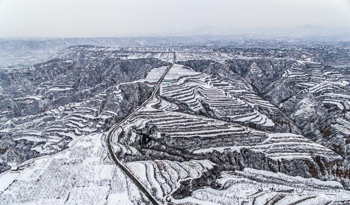UNITED NATIONS, Feb. 22 (Xinhua) -- A new report by the Food and Agriculture Organization (FAO) warned that mankind's future ability to feed itself is in jeopardy due to intensifying pressures on natural resources, mounting inequality, and the fallout from a changing climate, a UN spokesman said here Wednesday.
"Though very real and significant progress had been made in reducing global hunger in the past, this has come at a heavy cost to the natural environment," UN spokesman Stephane Dujarric said at a daily news briefing here.
"The report finds that nearly half of the earth's forests are now gone, groundwater sources are being rapidly depleted and biodiversity has been deeply eroded," said the spokesman.
"Almost half of the forests that once covered the earth are now gone. Groundwater sources are being depleted rapidly. Biodiversity has been deeply eroded," said the report, entitled "The Future of Food and Agriculture: Trends and Challenges report."
As a result, "planetary boundaries may well be surpassed, if current trends continue," added FAO Director-General José Graziano da Silva, underlining the gravity of the situation.
With global population estimated to reach 10 billion by 2050, worldwide demand for agricultural products could be pushed by as much as 50 percent above current levels, intensifying pressures on already-strained natural resources.
At the same time, the report argues, greater number of people will be eating fewer cereals and larger amounts of meat, fruits, vegetables and processed food -- a result of an ongoing global dietary transition that will further add to those pressures, driving more deforestation, land degradation and greenhouse gas emissions.
According to FAO, without a push to invest in and reorganizing food systems, many people will remain hungry in 2030, the year by which the 2030 Agenda for Sustainable Development and its Sustainable Development Goals (SDGs) aim to eradicate chronic food insecurity and malnutrition.
"Without additional efforts to promote pro-poor development, reduce inequalities and protect vulnerable people, more than 600 million people would still be undernourished in 2030," the report noted.
In fact, the current rate of progress would not even be enough to eradicate hunger by 2050, it said.
Reducing fossil fuel dependency will also help cut agricultural green-house gas emissions, conserve biodiversity, and reduce waste, it said.
Furthermore, investments in agriculture and agri-food systems, as well as in research and development, are needed to sustainably boost food production and help producers better cope with water scarcity and other climate change impacts, the report added.












